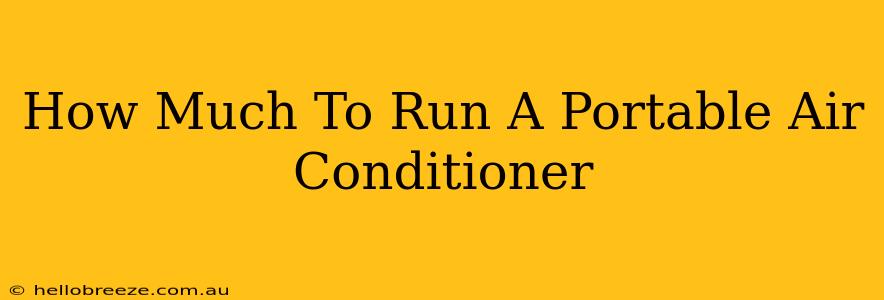Summer heat can be brutal, and a portable air conditioner can be a lifesaver. But before you plug one in, you might be wondering: how much will this cost me? The truth is, the cost of running a portable AC varies significantly depending on several factors. Let's break down the key elements influencing your energy bill and help you estimate your expenses.
Factors Affecting the Running Cost of a Portable AC
Several factors determine how much it will cost you to run a portable air conditioner. These include:
1. The Size (BTU) of Your Unit:
The British Thermal Unit (BTU) rating indicates the cooling capacity of your air conditioner. Higher BTU units cool larger spaces more effectively but consume more energy, leading to higher running costs. A smaller unit in a large room will work harder (and cost more) to achieve the desired temperature. Choose a unit appropriately sized for the area you're cooling.
2. Energy Efficiency (EER/SEER):
The Energy Efficiency Ratio (EER) and Seasonal Energy Efficiency Ratio (SEER) measure how efficiently the AC converts electricity into cooling. Higher EER/SEER ratings mean the unit uses less energy to produce the same amount of cooling, resulting in lower operating costs. Look for units with high EER/SEER ratings for better energy savings. Check the energy star rating for a reliable indication of efficiency.
3. Your Electricity Rates:
Your local electricity provider sets the price per kilowatt-hour (kWh). Higher electricity rates directly translate to higher AC running costs. Check your electricity bill to determine your kWh rate.
4. Your Usage:
How many hours per day do you run your portable air conditioner? The more you use it, the higher your electricity bill will be. Consider using it strategically – only when needed, and potentially during off-peak hours if your electricity provider offers different rates.
5. Ambient Temperature:
The hotter the outside temperature, the harder your AC has to work to cool your space, increasing energy consumption. On extremely hot days, expect higher running costs.
6. Room Insulation:
Poorly insulated rooms lose cool air more quickly, forcing your AC to work harder and consume more energy. Improving your room's insulation can significantly reduce your cooling costs.
Calculating Your Estimated Running Costs
To estimate your costs, you'll need the following information:
- Your AC's power consumption (Watts): This is usually found on the unit's label.
- Your electricity rate (dollars per kWh): Check your electricity bill.
- Your daily usage (hours): How many hours per day will you run the unit?
Here's the formula:
(Watts / 1000) * hours per day * electricity rate = daily cost
Example: A 1000-watt AC running for 8 hours a day with a $0.15/kWh electricity rate would cost approximately: (1000/1000) * 8 * $0.15 = $1.20 per day.
Tips for Reducing Your Portable AC Running Costs
- Choose an energy-efficient model: Look for high EER/SEER ratings.
- Use your AC strategically: Only run it when necessary and for shorter periods.
- Improve room insulation: Seal windows and doors to minimize heat loss.
- Use fans strategically: Fans can help circulate cool air, reducing the burden on your AC.
- Regular maintenance: Keep the filters clean to ensure optimal performance.
- Consider a smart thermostat: Smart thermostats can optimize your AC's usage based on your preferences and energy costs.
By understanding these factors and employing these energy-saving strategies, you can enjoy the comfort of a portable air conditioner without breaking the bank. Remember that these are estimates; your actual cost may vary based on the specific circumstances.

